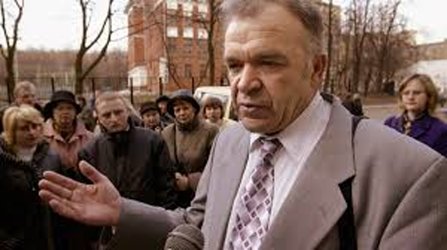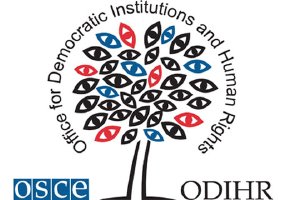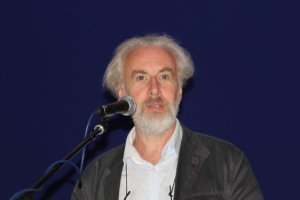Victoria Arnold, Moscow Correspondent for Forum 18 News Service, a human rights organization based in Oslo, Norway, filed this report on Russian government actions against Jehovah’s Witnesses since liquidating the religion across Russia in April 2017. Forum 18 provides in-depth reporting and analysis of religious freedom issues worldwide, its name based on Article 18 of the Universal Declaration of Human Rights. Forum 18 summarizes Article 18 as:
- The right to believe, to worship and witness
- The right to change one’s belief or religion
- The right to join together and express one’s belief
RUSSIA: Fines, vandalism follow Jehovah’s Witness liquidation
By Victoria Arnold
As Jehovah’s Witnesses challenge the Supreme Court liquidation of all their organisations as “extremist”, their Centre is closed, police have sealed some Kingdom Halls and bank accounts are frozen. Individuals continue to face fines, children face pressure, and places of worship face increased vandalism.

Pressure on children, further fines for individuals and an upsurge in incidents of vandalism against places of worship have followed the 20 April Supreme Court ruling that the Jehovah’s Witness Administrative Centre and all its local religious organisations across Russia should be liquidated as “extremist”. The Centre’s activities are suspended, police have sealed some Kingdom Halls and all bank accounts have been frozen. One early denial of a civilian alternative to military service may foreshadow future difficulties for Jehovah’s Witness conscientious objectors.
On 25 May, FSB security service officers in Oryol arrested Danish citizen Dennis Christensen on suspicion of “continuing the activities of a banned extremist organization” (Article 282.2, Part 1 of the Criminal Code). The Oryol Jehovah’s Witness community was dissolved as “extremist” in June 2016, a decision which came into force in October 2016.
The criminal case against Christensen is the first to be initiated since the Supreme Court’s liquidation ruling.
According to Jehovah’s Witness reports, fifteen armed men raided a building in which local Jehovah’s Witnesses were meeting, took the worshippers’ passport details and seized their electronic devices. Several were then taken to the local FSB headquarters, where they were kept until the early hours of the morning. Law enforcement agents also conducted searches of believers’ homes.
So far, only Christensen has been charged. On 26 May, Soviet District Court in Oryol acceded to the FSB request to hold him in pre-trial custody for two months.
The many problems flow from both the 20 April liquidation ruling itself and the Justice Ministry’s earlier order suspending Jehovah’s Witness activities for the duration of court proceedings.
On 19 May, lawyers for the Administrative Centre lodged an appeal against the 20 April Supreme Court liquidation ruling. It is not known when the Supreme Court will hear the appeal.
Although the Supreme Court ruling has not yet entered into force, local religious organisations already appear to have been removed from Federal Tax Service records. In the records seen by Forum 18, local communities across several regions were already listed as “liquidated” and their activities as “terminated”, with the dates of termination (prekrashcheniye) ranging from 28 April to 12 May. The Administrative Centre itself is listed as having been liquidated on 27 April.
Forum 18 tried to reach Svetlana Borisova, who put forward the Justice Ministry’s case in the Supreme Court, to ask how Jehovah’s Witnesses in Russia can exercise their constitutional right to freedom of religion and belief now that all their organisations have been dissolved and their activities prohibited. The woman who answered the phone at Borisova’s Department for the Affairs of Religious Organisations on 26 May refused to answer any of Forum 18’s questions, referring all enquiries to the press service.
Liquidation ruling followed suspension order
Supreme Court Judge Yury Ivanenko issued the liquidation ruling after nearly 30 hours of hearings across 6 days. It declares the Administrative Centre an “extremist” organisation, orders that its activities and those of all 395 local Jehovah’s Witness organisations should be prohibited, and subjects its property to confiscation by the state (see F18News 20 April 2017 http://www.forum18.org/archive.php?article_id=2274).
According to the written verdict, seen by Forum 18, the ban on Jehovah’s Witness activity was effective immediately. The remainder of the verdict will not enter legal force unless the Centre’s appeal is unsuccessful, Jehovah’s Witnesses explained to Forum 18 on 1 May.
The Supreme Court’s ruling is also effective in Russian-annexed Crimea, where 22 Jehovah’s Witness organisations were registered under Russian law in 2015, Forum 18 notes.
The Justice Ministry lodged its suit at the Supreme Court on 15 March. On the same day, the Ministry also issued an Order summarily suspending most Jehovah’s Witness activities, including all public meetings and the Administrative Centre’s financial transactions (see F18News 21 March 2017 http://www.forum18.org/archive.php?article_id=2265).
Although the Justice Ministry press service claimed to Forum 18 that the Suspension Order did not apply to meetings for worship, Jehovah’s Witnesses described to Forum 18 several instances of law enforcement agents halting services. Some of these incidents have since led to prosecution under Article 20.28, Part 1, of the Administrative Code (“Organisation of or participation in the activities of a public or religious association, in relation to which a decision on the suspension of its activities is in force”).
“Very sad” consequences of liquidation ruling
Jehovah’s Witness lawyer Anton Bogdanov described the consequences of the liquidation ruling so far as “very sad”, adding that “Law enforcement agencies are already attempting to extend the application of the Supreme Court’s decision … to ordinary Jehovah’s Witness believers, creating obstacles for them in the confession of their faith”.
The Administrative Centre’s 19 May appeal, seen by Forum 18, claims that the Supreme Court’s decision was based on “the presumption of guilt”, and not on “a comprehensive, complete, objective, and direct investigation of the available evidence”. It also points out that the ruling violates the rights not only of the Centre itself, but also those of individuals and legal entities who were not permitted to participate in the case, and condemns it as unconstitutional and in contradiction of international law.
The Supreme Court has not yet set a date for the appeal hearing, but Jehovah’s Witnesses believe it could take place as late as September 2017.
In the meantime, Jehovah’s Witnesses have also submitted a challenge to Judge Ivanenko’s refusal, during the proceedings in April, to dismiss the Justice Ministry’s suit. The Supreme Court is due to hear this challenge on 13 June.
Liquidation ruling “disturbing”
Human rights commentators have continued to condemn the ban on Jehovah’s Witnesses in Russia. “Whether or not one agrees with the ideology of the Jehovah’s Witnesses is beside the point,” the then United Nations (UN) Special Rapporteur on the Rights to Freedom of Peaceful Assembly and of Association Maina Kiai commented to Forum 18 on 21 April. “This ruling is disturbing because of the precedent it sets. By defining extremism so loosely and subjectively, it paves the way for the government to liquidate virtually any religious organization that it chooses to target. It crosses the line into criminalizing thoughts and opinions, which is a very dangerous and slippery slope.”
Michael Georg Link, Director of the OSCE Office for Democratic Institutions and Human Rights (ODIHR), said in a press statement on 25 April that he was “deeply concerned by this unwarranted criminalization of the peaceful activities of members of the Jehovah’s Witnesses communities in Russia, eliminating this community as a viable entity in the country”. The Supreme Court decision “poses a threat to the values and principles that democratic, free, open, pluralistic and tolerant societies rest upon”, he added.
Read the full text of Victoria Arnold’s article for Forum 18.
A compilation of Organisation for Security and Co-operation in Europe (OSCE) freedom of religion or belief commitments can be found at http://www.forum18.org/archive.php?article_id=1351.


